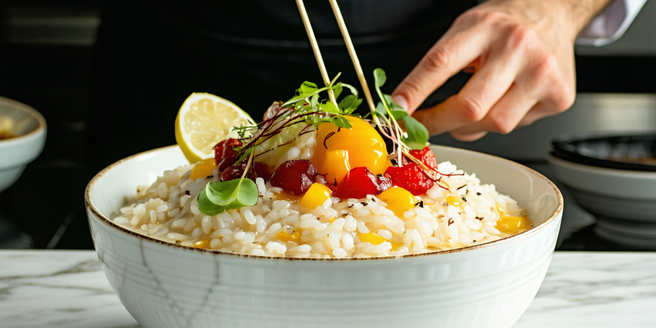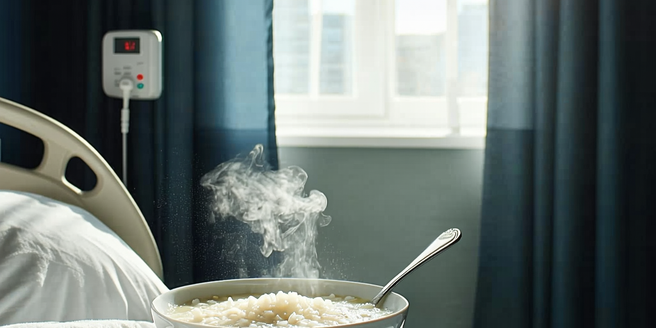
The Emotional Connection Between Food and Healing
| Aspect | Description | Impact |
| Comfort | Food can provide a sense of safety and comfort, recalling positive memories. | Promotes relaxation and emotional well-being. |
| Nostalgia | Certain meals can trigger memories of better times and loved ones. | Offers emotional support during tough times. |
| Culture | Culinary traditions tie individuals to their cultural roots. | Enhances feelings of identity and belonging. |
| Social Bonds | Sharing meals can strengthen relationships and create new memories. | Builds community and support networks. |
| Healing | Certain foods are believed to aid in the physical recovery process. | Contributes to a holistic health approach. |
| Mindfulness | Eating mindfully can enhance the appreciation of the present moment. | Improves mental and emotional clarity. |
Rice Pudding: Comfort Food with a History
Rice pudding is a dish with roots extending across cultures and centuries, known for its simplicity and warmth. Its basic ingredients — rice, milk, and sugar — have made it a staple in diverse cuisines worldwide. Each culture has added its unique twist, from spices like cinnamon and nutmeg to garnishes such as raisins or fruit compotes. Its rich history reflects its role as a comfort food, a humble yet indulgent treat that generations have turned to for solace. In times of healing, rice pudding serves not just as a source of sustenance, but as a vessel for nostalgia. It is these qualities that make it particularly impactful for those coping with illness, such as cancer, where comfort and emotional support are paramount. Enjoying rice pudding can be a momentary escape, evoking memories of home and comfort, illustrating the profound connection between food and emotional well-being.
Nostalgia’s Role in Coping with Cancer
Nostalgia acts as a potent tool in coping with cancer, providing psychological comfort and emotional support. The memories attached to certain foods can evoke a sense of safety and happiness, invaluable to those undergoing the stress of illness. This emotional thread can be particularly strong with dishes that carry personal or familial significance. Rice pudding, for instance, may remind someone of their grandmother’s kitchen, filling them with warmth and a sense of belonging. Such nostalgic connections can elicit positive emotions, offering a brief respite from the rigors of treatment. This temporary mental escape can play a crucial role in enhancing quality of life during long recovery journeys. For many, reconnecting with these fond memories through food provides a soothing routine, anchoring them through turbulent times. Thus, nostalgia not only fosters an emotional sanctuary but also contributes to a holistic healing process, supporting the psychological needs of cancer patients.
The Science Behind Comfort Foods in Illness Recovery
Comfort foods play a significant role in illness recovery, with scientific research highlighting their impact on emotional and physical well-being. These foods often trigger the release of endorphins, the body’s natural mood elevators, creating a sense of pleasure and happiness. For patients with illnesses like cancer, this can provide an essential boost in morale. Additionally, the familiar flavors and aromas of comfort foods can stimulate appetite, encouraging nourishment during times when eating may be challenging. This is particularly important when undergoing treatments that affect taste and appetite. The psychological benefits are equally impactful, as the calming effect of comfort foods can reduce stress and anxiety, important factors in overall health recovery. Rice pudding, as a representative comfort food, provides both these physical and emotional benefits. Understanding these scientific underpinnings helps reinforce the value of incorporating comfort foods into the healing process, supporting body and soul during recovery.
Personal Stories: Finding Solace in Familiar Flavors
Stories of individuals finding comfort in familiar flavors during cancer recovery abound, each unique yet unified by the theme of solace found in food. One such story is of Lydia, who recounts the immense comfort she felt in a simple bowl of rice pudding during her chemotherapy treatments. It was a reminder of her childhood, her grandmother’s soothing voice, and the safe haven of her family kitchen. For another survivor, Mark, it was his mother’s chicken soup that provided not only nourishment but a deep sense of connection to happier memories. These narratives underscore the powerful role food plays beyond sustenance. It becomes a bridge, connecting survivors to their pasts, bringing forth cherished memories and a sense of continuity in life. These personal experiences highlight the ways in which food, rich in cultural and familial significance, can offer psychological support and hope during the toughest phases of illness.
The Nutritional Benefits of Rice Pudding for Cancer Patients
Rice pudding, while simple, offers several nutritional benefits particularly supportive for cancer patients. It is rich in carbohydrates, providing a quick energy source, which is important as patients often experience fatigue during treatment. The milk or milk alternatives used are a good source of calcium and vitamin D, promoting bone health which can be compromised during chemotherapy. Additionally, the inclusion of eggs improves the protein content, essential for cell repair and immune function. For those with dietary restrictions, rice pudding can be easily adapted with lactose-free or plant-based milks and sugar alternatives, making it an inclusive option for varied diets. Its soft texture is gentle on mouths sensitive from treatment and can be flavored simply to suit altered taste preferences. Thus, rice pudding not only provides comfort but also meets nutritional needs, supporting recovery with its balanced profile of carbohydrates, proteins, and fats.
Recipes to Recreate Memories and Boost Health
Recreating cherished recipes can serve as a therapeutic outlet, providing both emotional and physical nourishment. For cancer patients, cooking familiar recipes like rice pudding becomes a powerful tool for healing. Here’s a simple recipe to try: Begin with a cup of your preferred rice, slowly cooked with two cups of chosen milk, be it dairy or a plant-based option. Add a natural sweetener like honey or maple syrup, and a pinch of cinnamon for warmth. As it thickens, stir in a beaten egg for added creaminess and protein. Top with sliced almonds or berries to enhance its nutritional value and taste. This recipe not only yields a delightful dish but also opens up a sensory experience, renovating dormant memories and emotions. These culinary endeavors foster a connection to loved ones and past moments of joy, offering comfort and health benefits that support emotional resilience and physical recovery in cancer journeys.
Balancing Tradition and Health in Dietary Choices
Striking a balance between traditional recipes and current health needs is crucial for those in recovery, such as cancer patients. Time-honored dishes like rice pudding can be modified to align with contemporary health guidelines without sacrificing their nostalgic essence. The integration of whole, nutrient-rich ingredients such as brown rice and almond milk ensures a lower glycaemic index while providing fiber and essential nutrients. Reducing sugar intake by using natural alternatives enhances health benefits without losing sweetness. These adaptations allow individuals to enjoy beloved dishes, maintaining their dietary preferences and cultural traditions. Moreover, it supports an inclusive dietary practice that promotes community connections and celebrations, essential to holistic healing experiences. Emphasizing both tradition and health encourages mindful eating, helping patients to nourish their bodies while feeding their souls, fostering a pathway that respects their history and nurtures their present health journey.
Community Support Through Shared Recipes and Memories
Community support is a cornerstone in cancer journeys, and shared recipes often act as a crucial bonding tool. These culinary exchanges create a network of solidarity, allowing individuals to share both practical cooking tips and emotional stories associated with specific dishes. For many, exchanging recipes like rice pudding opens dialogue about family traditions, cultural heritage, and personal challenges faced during treatment. These shared experiences foster a sense of belonging, offering emotional comfort and practical support. For cancer patients, it’s not just the recipe transmission but the revival of fond memories tied to these dishes that enhances their recovery experience. This communal sharing forms a tapestry of stories and flavors, richer than any single narrative, providing invaluable moral support and companionship. Such interactions highlight the therapeutic power of food in building communities, underscoring its role in emotional healing and relational growth during illness.
Conclusion: The Power of Nostalgia in Cancer Journeys
Nostalgia holds tremendous power in cancer journeys, acting as both a bridge to the past and a support for the present. Through food, individuals reconnect with comforting memories, drawing strength and solace from the flavors that define their personal histories. Rice pudding exemplifies this connection, embodying warmth, simplicity, and cultural depth. As cancer patients navigate their recovery, familiar dishes provide a comforting constant, supporting both emotional and nutritional needs. By intertwining traditional recipes with health-conscious adaptations, individuals can honor their heritage while prioritizing their health. The communal sharing of these culinary traditions further enhances healing, fostering connections and emotional resilience. Ultimately, the role of nostalgia in food highlights its significance in holistic cancer care, offering hope and healing through the simple yet profound act of remembering cherished flavors.

